Archive for September, 2020
-
Friday’s Selling Continues Into Today
Eddy Elfenbein, September 21st, 2020 at 10:27 amOn Friday, the S&P 500 finally closed below its 50-day moving average. This halted an impressive streak which started in April.
The 50-DMA may have been a key indicator for the bears because the selling has continued to today. The S&P 500 has been down as much as 2% today.
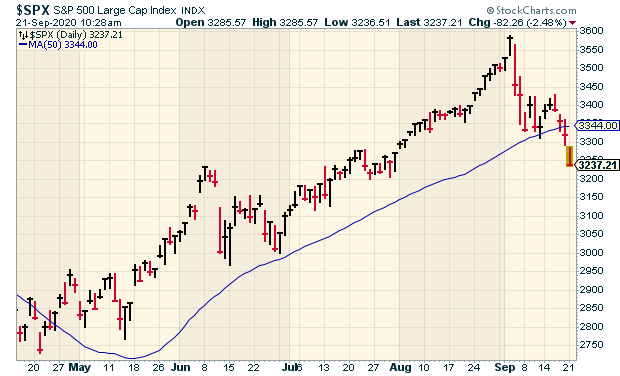
I have a simple way of looking at the “lockdown trade.” Just look at Zoom and Disney. I originally meant this as a joke (“The Elfenbein Lockdown Index”), but it does have value. The two stocks tend to move oppositely. Why? Because Zoom prospers if the economy is locked down while Disney prospers on a re-opening. It’s that simple. Today, Zoom is up by 5% while Disney is down by 3%. So lockdown worries are back.
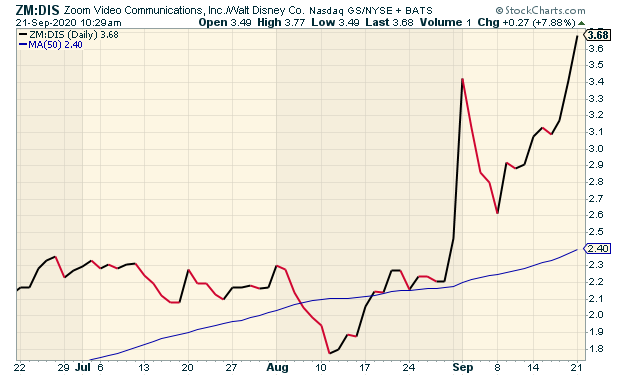
Financial stocks are doing particularly poorly today. That’s also causing value stocks to do worse than growth stocks. Most every sector is down but the cyclicals are down the most while the defensive stocks are down the least. A few stocks like Walmart and Costco are in the green today.
Shares of Nikola are getting absolutely trashed this morning. The company went public in June. A few days ago, a research company, Hindenburg Research, released a scathing report which claimed the company misled investors about its technology.
The report is titled, “Nikola: How to Parlay An Ocean of Lies Into a Partnership With the Largest Auto OEM in America.” Not much for subtlety. The company responded, but the research firm was unimpressed.
Early this morning, literally at 2:21 am, the founder of Nikola announced his resignation via Twitter. Shortly after its IPO, Nikola got to $94 per share. This morning, it’s been as low at $24 per share.
This is also a good example of how markets should work. Short-sellers are often attacked by companies, but short sellers can also root out misstatements by management. They help keep the system honest.
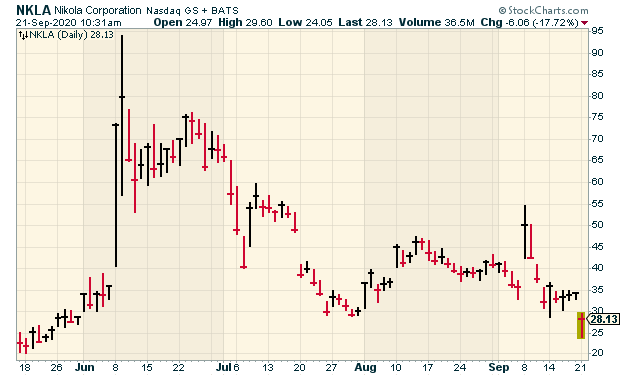
-
Morning News: September 21, 2020
Eddy Elfenbein, September 21st, 2020 at 7:05 amThe Age of Electric Cars Is Dawning Ahead of Schedule
Banks Moved $2 Trillion Amid Laundering Orders, ICIJ Says & HSBC, StanChart Shares Fall To 22-Year Lows On Reports Of Illicit Money Flows
China’s ByteDance Says TikTok Will Be Its Subsidiary Under Deal With Trump, Trump Wants to Cripple TikTok and WeChat. Why? & ‘There’s No There There’: What the TikTok Deal Achieved
Jeff Zucker Helped Create Donald Trump. That Show May Be Ending.
Thanks to Google, App Store Monopoly Concerns Have Now Reached India
The 2020 Housing Boom Is A Perilous Economic Signal
Retailers Anxious About Socially-Distant Black Friday Rush
Amazon’s Buying Spree for Used Airplanes Makes Green Pledge Harder to Keep
Nikola Founder Resigns as Chair Amid Allegations, SEC Probe
Music Festivals Create Their Own ‘Bubbles’ to Get Partiers Back Out
Joshua Brown: What If He Doesn’t Leave? & My Favorite New Investing App On Earth
Ben Carlson: Negativity Is Not an Investment Strategy & Everything You Need to Know About Retirement
Michael Batnick: Animal Spirits: The Work From Home Backlash & Ideas For Retirement
Jeff Miller: Weighing the Week Ahead: Investors Need Some Accurate Evidence!
Be sure to follow me on Twitter.
-
CWS Market Review – September 18, 2020
Eddy Elfenbein, September 18th, 2020 at 7:08 amThe COVID-19 pandemic is causing tremendous human and economic hardship across the United States and around the world. – This week’s FOMC policy statement
Superficially, this is a quiet time for Wall Street. Daily volatility has been modest, and there’s not much big news. However, just beneath the surface, there’s a lot going on.
The trend that’s most prominent, in my opinion, is the shift from growth stocks to value stocks. I talked about this at length in last week’s issue. The trend continued this week after a modest pushback from growth. This could be the start of a long run for value.
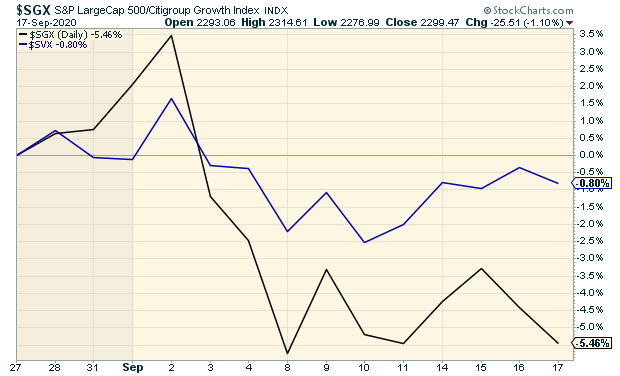
We also had a Federal Reserve meeting this week. As expected, the Fed decided to forgo any change in interest rates. Additionally, it reiterated its commitment to keep interest rates low for a long time. Until now, the Fed has strongly suggested it would follow this policy. Now there’s no doubt as to the board’s intent. I’ll explain what it means for us and our portfolios.
We also got a stock split this week from Trex. The deck maker has been on a tear for us this year. Through Thursday, we have a 52% profit in Trex. Now we have twice as many shares! Later on, I’ll preview next week’s earnings report from FactSet. This is another big winner for us. The financial-data stock is up 24% this year. I’m expecting more great results from FactSet. I also have some updates on our Buy List stocks. First, though, let’s look at what the Fed heads had to say this week.
The Fed Is Committed to 0%
The Federal Reserve met again this week. As expected, the central bank didn’t make any change to its target for the Fed funds rate, which is still 0% to 0.25%. Basically, rates are flat on the floor.
The Fed also mentioned its willingness to let inflation drift above 2%. This was the big policy change that it had announced at its recent Jackson Hole conference. Until then, the Fed had held a target of 2% for inflation. Of course, inflation has been running below that almost consistently.
So the Fed is now not so worried about fighting the last war—the war on inflation. To be sure, it said that it’s willing to maintain 2% as a long-run goal for inflation. This means, in theory, that the Fed is willing to allow inflation of more than 2%, which can be offset by periods of sub-2% inflation, and it will all magically add up to 2%.
Yeah, right.
Look, the Fed’s intentions are perfectly fine, but they’ve consistently misjudged the economy. In trying to fight inflation, they’re fighting an enemy that’s simply not there, and they’ve actually harmed the economy while doing so. I think it’s for the best that they leave interest rates alone for some time.
What does inflation mean for us? It’s terrible. From our perspective, high inflation is bad news for stocks. But by high inflation, I mean over 5%. We’ve haven’t seen numbers like that in years.
I should add that the recent inflation reports have run a little hot. But that’s to be expected after three months of deflation, meaning falling prices, since the lockdowns started.
The Fed isn’t adopting this policy based on the sound judgment and the wisdom of its policymakers. No, it’s because everything else they’ve tried has failed. They’re doing this because they have to.
In its policy statement, the FOMC said, “The Committee expects to maintain an accommodative stance of monetary policy until these outcomes are achieved.” In English, this means “we won’t be raising rates for a looooong time.”
I’m not exaggerating. Here’s proof. The Fed also released its latest economic projections. These projections are notoriously off the mark, but it’s interesting to see what the Fed is thinking.
The FOMC has 17 members. (It has 19 normally, but there are two vacancies.) All 17 members are against raising rates this year. All 17 members are against raising rates next year as well. Sixteen of the 17 are against raising rates the year after that, and thirteen of the 17 are against raising rates the year after that.
Add it all up, and this means that the Fed is tacitly committed to keeping rates near 0% through 2023. The Fed also projects that inflation will neatly reach 2% in 2023. Call me a doubter.
More importantly, what does this mean for us? It’s good for stocks. Low rates are usually a strong catalyst for higher equity valuations. In particular, it’s good for high-yielding stocks. AFLAC (AFL), for example, currently yields 3%. You can’t get that at the bank. Also, AFLAC has increased its dividend for 37 consecutive years. On our Buy List, Hershey (HSY) and Hormel Foods (HRL) are also good dividend stocks.
Low rates for longer will also be good news for the housing sector. Mortgage rates are very low. This week, we learned that homebuilder confidence just touched an all-time high. This is good news for a company like Trex (which I’ll be discussing next).
I also want to mention that I’m seeing some signs of weakness in this market. No reason to panic, but the market likes to give us a nice shake every so often. For example, the S&P 500 has run above its 50-day moving average every day for nearly five months. This is a quick measure of the stock market’s momentum. Twice in the last five days, the S&P 500 has dipped below its 50-DMA during the trading day, but it hasn’t closed the day below it.
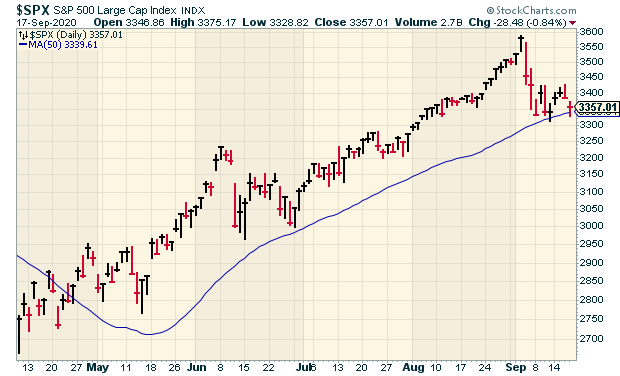
The economy may also be weaker than a lot of folks realize. This week’s industrial-production report was below expectations. So was the housing-starts report. Core retail sales fell slightly last month.
While the economy has certainly improved, the recovery has been choppy and uneven. There are lots of sectors of the economy that are still in rough shape. Furthermore, there’s the uncertainty of the U.S. election which is only a few weeks away. Now let’s look at our #1 stock this year.
Trex Splits 2-for-1
On Tuesday, shares of Trex (TREX) split 2-for-1. This means shareholders got twice as many shares while the share price fell in half.
A stock split doesn’t add any value in and of itself. Shareholders seem to prefer a stock with a lower nominal price, and boards of directors are willing to comply. Stock splits were much more popular in the 1990s.
I remember when the airline JetBlue split 3-for-2 three times in three years, even though the stock didn’t do much of anything. These splits don’t happen nearly as much as they used to.
Trex’s Buy Below price splits along with the stock. The Buy Below is now $75 per share.
For track-record purposes, I assume the Buy List is a $1 million portfolio that’s equally weighted at the beginning of each year. For this year, that meant we ”bought” 445.03783 shares of Trex with a starting value of $89.98 per share. That now becomes 890.07566 shares at $44.94 per share.
Trex has had an outstanding year for us. Last month, Trex reported Q2 earnings of 81 cents per share. That beat the Street by 16 cents per share. Quarterly sales rose 7% to $221 million. Not bad, considering we’re in an economic lockdown. The company also had nice increases to its gross and EBITDA margins. For Q3, Trex expects a 13% sales increase over last year’s Q3.
FactSet’s Earnings Preview
FactSet (FDS) is scheduled to report its fiscal Q4 earnings on Thursday, September 24. The financial-data company has been a very good stock for us this year, and the report for fiscal Q3 was quite good.
Let’s look at some details from Q3, which ended on May 31. Adjusted diluted earnings rose by 9.2% to $2.86 per share. That beat estimates by 43 cents per share. Quarterly revenues rose 2.6% to $374.1 million, while organic revenues climbed 2.6% to $375.3 million. I was particularly impressed to see FactSet’s operating margin rise by 1.5% to 35.5%.
For guidance, FactSet said it expects full-year revenues to range between $1.485 billion and $1.49 billion. FactSet also expects full-year earnings to range between $10.40 and $10.60 per share. That implies fiscal Q4 earnings of $2.41 to $2.61 per share. The consensus on Wall Street is for $2.54 per share.
The Q3 earnings were so strong that FactSet raised both ends of its full-year guidance by 55 cents per share. FactSet is our fourth-best stock this year. Through Thursday, FactSet is up over 24% for us. The company has raised its dividend every year since 1999.
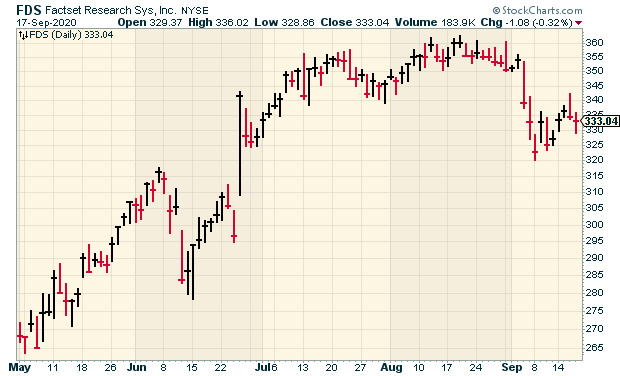
Buy List Updates
Shares of Stryker (SYK) have been trending higher recently. The stock just hit a post-lockdown high, and it’s not far from its pre-lockdown high. This week, I’m lifting our Buy Below on Stryker to $220 per share. The next earnings report should be out in late October.
Becton, Dickinson (BDX) has been going through a rough patch. The stock is down close to 20% since the beginning of August. This week, the Wall Street Journal said that Becton’s coronavirus test is giving false-positive results. So far, the number of bad results is small, but it’s not good news. Becton is planning to ramp up its production of these tests to two million per week. I’m lowering our Buy Below on BDX to $250 per share.
Shares of Eagle Bancorp (EGBN) are sliding yet again. On Thursday, EGBN closed at $27.79 per share. That’s a six-month low. The stock is selling for roughly three-fourths of its book value. The dividend now yields 3.17%. I’m lowering our Buy Below price on Eagle to $31 per share.
Sherwin-Williams (SHW) has also been hot lately. This week, I’m bumping up its Buy Below to $720 per share.
That’s all for now. Next week will be pretty light as far as economic reports go. On Tuesday, we’ll get the report on existing-home sales. Thursday will be another report on initial jobless claims. Also on Thursday, the report on new-home sales comes out. On Friday, the report for durable goods is due out. Be sure to keep checking the blog for daily updates. I’ll have more market analysis for you in the next issue of CWS Market Review!
– Eddy
-
Morning News: September 18, 2020
Eddy Elfenbein, September 18th, 2020 at 7:02 amRussia Hits Brakes on Rate Cuts, Sees Further Easing Possible
Fed Weighs Extending Bank Dividend Cap, Restarts Stress Test
Unemployment Claims Dip, But Layoffs Remain A Worry
Small Tech Stocks Soar as the Future Arrives Early
ByteDance Plans TikTok IPO To Win U.S. Deal As Deadline Looms
China’s Tencent Rebrands WeChat Work App Ahead of Trump Ban
Dollar Weakness, or Dollar Crash?
If Jerome Powell Has a Middle Name, It Might Well Be Bert
Here’s How Stimulus Checks Could Cost Americans In The Long Run
Nearly 60% of COVID-19 Business Closures Are Permanent
Worst Shipping Crisis in Decades Puts Lives and Trade at Risk
Joshua Brown: It’s Not “Stimulus” If It’s Open-Ended
Ben Carlson: How Are Institutional Investors Ever Going to Hit Their Return Targets?
Michael Batnick: Where Are They Going?
Howard Lindzon: Narvar Founder And CEO Amit Sharma Joins Me On Panic With Friends
Be sure to follow me on Twitter.
-
Initial Claims Continue to Fall
Eddy Elfenbein, September 17th, 2020 at 11:47 amThis morning’s initial claims report fell to 860,000. That’s the lowest since the lockdowns started six months ago. Economists had been expecting 875,000. Continuing claims are down to 12.628 million. Things are getting better, albeit very slowly.
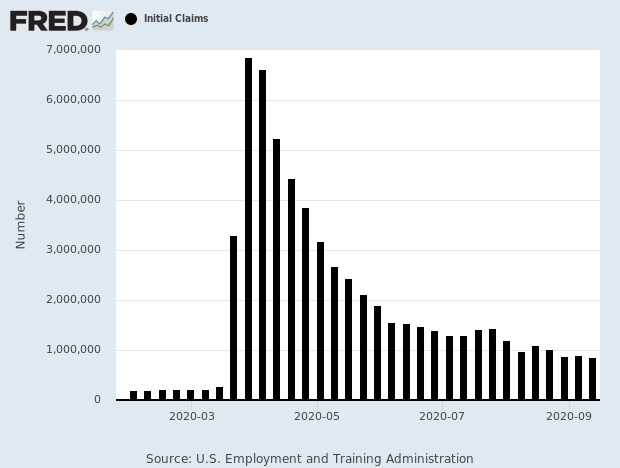
Also this morning, the housing starts report for August fell to 1.416 million (that’s the annualized number). That drop was more than expected.
The housing market has outperformed the broader economy despite nearly 30 million people being on unemployment benefits. Unemployment has disproportionately affected low-wage workers, who are typically renters. The 30-year fixed mortgage rate is around an average of 2.86%, according to data from mortgage finance agency Freddie Mac.
Home building last month was pulled down by a 22.7% tumble in starts for the volatile multi-family housing segment to a pace of 395,000 units. But construction of singe-family housing units, which accounts for the largest share of the housing market, increased 4.1% to a rate of 1.021 million units.
Groundbreaking activity rose in the West and Midwest, but fell in the South and Northeast.
Permits for future homebuilding dropped 0.9% to a rate of 1.470 million units in August. Single-family building permits increased 6.0% to a rate of 1.036 million units. Multi-family building permits decreased 14.2% to a rate of 434,000 units.
The market is down today. This is the second time in the last week that the S&P 500 dipped its toe below its 50-DMA.
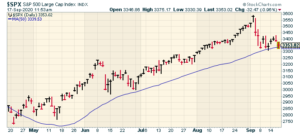
-
Morning News: September 17, 2020
Eddy Elfenbein, September 17th, 2020 at 7:03 amDubai, Tel Aviv to Boost Diamond Trade as UAE-Israel Links Grow
The Wild Summer of 2020 Turned Small Investors Into Whales
Americans Keep Spending, But Growth of Retail Sales Slows
Just What Is It That Judy Shelton’s Critics Are So Afraid Of?
The Simple Thing Trump Doesn’t Get About The Stock Market
Stop Expecting Life to Go Back to Normal Next Year & Yes, 2021 Could Be Worse
ByteDance’s Bid To Keep Most Of TikTok Faces Major Hurdles
Trump Casts New Doubt On Any Deal To Keep TikTok Alive In U.S.
Snowflake More Than Doubles in Debut as Wall Street Embraces Tech IPOs
The Musk Method: Learn From Partners Then Go It Alone
Hollywood Rethinks Movie Release Schedule As ‘Tenet’ Stumbles At Box Office
U.S. Is No Longer Land of Opportunity for Foreign MBA Students
Ben Carlson: Animal Spirits: Upside Down Markets
Michael Batnick: What Happens if Interest Rates Rise?
Joshua Brown: Powering Through & Berkshire in Techland
Be sure to follow me on Twitter.
-
The Fed’s Policy Statement
Eddy Elfenbein, September 16th, 2020 at 2:02 pmHere’s the Fed’s latest policy statement:
The Federal Reserve is committed to using its full range of tools to support the U.S. economy in this challenging time, thereby promoting its maximum employment and price stability goals.
The COVID-19 pandemic is causing tremendous human and economic hardship across the United States and around the world. Economic activity and employment have picked up in recent months but remain well below their levels at the beginning of the year. Weaker demand and significantly lower oil prices are holding down consumer price inflation. Overall financial conditions have improved in recent months, in part reflecting policy measures to support the economy and the flow of credit to U.S. households and businesses.
The path of the economy will depend significantly on the course of the virus. The ongoing public health crisis will continue to weigh on economic activity, employment, and inflation in the near term, and poses considerable risks to the economic outlook over the medium term.
The Committee seeks to achieve maximum employment and inflation at the rate of 2 percent over the longer run. With inflation running persistently below this longer-run goal, the Committee will aim to achieve inflation moderately above 2 percent for some time so that inflation averages 2 percent over time and longer-term inflation expectations remain well anchored at 2 percent. The Committee expects to maintain an accommodative stance of monetary policy until these outcomes are achieved. The Committee decided to keep the target range for the federal funds rate at 0 to 1/4 percent and expects it will be appropriate to maintain this target range until labor market conditions have reached levels consistent with the Committee’s assessments of maximum employment and inflation has risen to 2 percent and is on track to moderately exceed 2 percent for some time. In addition, over coming months the Federal Reserve will increase its holdings of Treasury securities and agency mortgage-backed securities at least at the current pace to sustain smooth market functioning and help foster accommodative financial conditions, thereby supporting the flow of credit to households and businesses.
In assessing the appropriate stance of monetary policy, the Committee will continue to monitor the implications of incoming information for the economic outlook. The Committee would be prepared to adjust the stance of monetary policy as appropriate if risks emerge that could impede the attainment of the Committee’s goals. The Committee’s assessments will take into account a wide range of information, including readings on public health, labor market conditions, inflation pressures and inflation expectations, and financial and international developments.
Voting for the monetary policy action were Jerome H. Powell, Chair; John C. Williams, Vice Chair; Michelle W. Bowman; Lael Brainard; Richard H. Clarida; Patrick Harker; Loretta J. Mester; and Randal K. Quarles.
Voting against the action were Robert S. Kaplan, who expects that it will be appropriate to maintain the current target range until the Committee is confident that the economy has weathered recent events and is on track to achieve its maximum employment and price stability goals as articulated in its new policy strategy statement, but prefers that the Committee retain greater policy rate flexibility beyond that point; and Neel Kashkari, who prefers that the Committee to indicate that it expects to maintain the current target range until core inflation has reached 2 percent on a sustained basis.
The Fed is keeping interest rates on the floor and is apparently willing to do that for the next few years. What’s notable is that the Fed is willing to let inflation drift above 2%. Interestingly, there were two dissents.
Here are the Fed’s economic projections.
In my opinion, the projections aren’t that important. I don’t think the Fed has a good idea what will be needed in three years. Having said that, the Fed raised its estimate for Q3 GDP. The Fed also sees unemployment improving, and it raised its outlook for inflation.
As far as interest rates go, the FOMC unanimously sees rates being near 0% for this year and next. A strong majority sees rates still near 0% in 2022 and 2023. Three more years of no rate hikes.
-
Homebuilder Confidence Hits All-Time High
Eddy Elfenbein, September 16th, 2020 at 10:48 amThe Federal Reserve will wrap up its meeting today. Don’t expect much news, but the policy statement will be closely read for clues.
This morning, we learned that retail sales rose by 0.6% in August. In the last year, retail sales are up 2.6%.
Excluding gasoline, retail sales were up 0.6% last month. The figures for June and July were revised lower.
Core retail sales, which correspond most closely with the consumer spending component of gross domestic product, fell 0.1% last month after a downwardly revised 0.9% increase in July, the Commerce Department said on Wednesday.
This category, which excludes automobiles, gasoline, building materials and food services, was previously reported to have advanced 1.4% in July. Economists polled by Reuters had forecast core retail sales rising 0.5% in August.

In other news, homebuilder confidence rose to an all-time high.
U.S. single-family homebuilder confidence increased to a record high in September as historically low mortgage rates continue to boost the housing market despite the COVID-19 recession, which has left tens of millions of Americans unemployed.
The NAHB/Wells Fargo Housing Market Index (HMI) rose five points to an all-time high of 83 this month, data showed on Wednesday. A reading above 50 indicates that more builders view conditions as good than poor. -
Wall Street Bombed 100 Years Ago Today
Eddy Elfenbein, September 16th, 2020 at 8:14 amOne hundred years ago today, at one minute past noon, a bomb exploded in Wall Street which killed 38 people and seriously wounded 143. Windows were shattered up to a half-mile away.
A horse-drawn wagon loaded with dynamite had been parked in front of the headquarters of J.P. Morgan. The dynamite was packed with 500 pounds of cast-iron slugs.
For the first time ever, trading was halted on the floor of the New York Stock Exchange because of violence. The previous day, anarchists Sacco and Vanzetti had been indicted for bank robbery and murder. At the time, it was the deadliest terrorist attack on U.S. soil.
No one knows who carried out the attack, but it was assumed to have been orchestrated by an Italian anarchist group. They had carried out a series of bombings in June 1919.
Damage from the blast is still visible on 23 Wall Street. J.P. Morgan refused to have it repaired.
The perpetrators were never caught.
-
Morning News: September 16, 2020
Eddy Elfenbein, September 16th, 2020 at 7:08 amWorld Economy to Withstand Virus Better Than Forecast, OECD Says
UAE Signals It’ll Atone For Pumping Too Much Oil in July, August
‘Farewell, Fossil Fuels’? What Oil’s Demise Will Do To The World’s Leading Economies
Europe’s Economic Revival Is Imperiled, Raising the Specter of a Grinding Downturn
Fed Debates Next Steps After Shifting Approach to Rate-Setting
Both Candidates Support ‘Buy American’: Both Are Wrong
U.S. House Report Blasts Failures Of Boeing, FAA In 737 MAX Certification
Buffett-Backed Cloud Unicorn Snowflake Nets $3.4 Billion In Record-Breaking Software IPO
Ex-GM Executive Moonlights as Matchmaker in Deal With Startup Nikola
Movie Theaters Returned. Audiences Didn’t. Now What?
US Retailers Roll Out Foreign Toilet Paper Amid COVID-19 Pandemic
Joshua Brown: Gambling & Shorting Nikola, Most Stocks Are Terrible, The Options Trading Bubble
Michael Batnick: What Should Young Investors Read?
Ben Carlson: How To Get People To Save More Money
Nick Maggiulli: The 9 Best Income Producing Assets to Grow Your Wealth
Be sure to follow me on Twitter.
-
-
Archives
- April 2025
- March 2025
- February 2025
- January 2025
- December 2024
- November 2024
- October 2024
- September 2024
- August 2024
- July 2024
- June 2024
- May 2024
- April 2024
- March 2024
- February 2024
- January 2024
- December 2023
- November 2023
- October 2023
- September 2023
- August 2023
- July 2023
- June 2023
- May 2023
- April 2023
- March 2023
- February 2023
- January 2023
- December 2022
- November 2022
- October 2022
- September 2022
- August 2022
- July 2022
- June 2022
- May 2022
- April 2022
- March 2022
- February 2022
- January 2022
- December 2021
- November 2021
- October 2021
- September 2021
- August 2021
- July 2021
- June 2021
- May 2021
- April 2021
- March 2021
- February 2021
- January 2021
- December 2020
- November 2020
- October 2020
- September 2020
- August 2020
- July 2020
- June 2020
- May 2020
- April 2020
- March 2020
- February 2020
- January 2020
- December 2019
- November 2019
- October 2019
- September 2019
- August 2019
- July 2019
- June 2019
- May 2019
- April 2019
- March 2019
- February 2019
- January 2019
- December 2018
- November 2018
- October 2018
- September 2018
- August 2018
- July 2018
- June 2018
- May 2018
- April 2018
- March 2018
- February 2018
- January 2018
- December 2017
- November 2017
- October 2017
- September 2017
- August 2017
- July 2017
- June 2017
- May 2017
- April 2017
- March 2017
- February 2017
- January 2017
- December 2016
- November 2016
- October 2016
- September 2016
- August 2016
- July 2016
- June 2016
- May 2016
- April 2016
- March 2016
- February 2016
- January 2016
- December 2015
- November 2015
- October 2015
- September 2015
- August 2015
- July 2015
- June 2015
- May 2015
- April 2015
- March 2015
- February 2015
- January 2015
- December 2014
- November 2014
- October 2014
- September 2014
- August 2014
- July 2014
- June 2014
- May 2014
- April 2014
- March 2014
- February 2014
- January 2014
- December 2013
- November 2013
- October 2013
- September 2013
- August 2013
- July 2013
- June 2013
- May 2013
- April 2013
- March 2013
- February 2013
- January 2013
- December 2012
- November 2012
- October 2012
- September 2012
- August 2012
- July 2012
- June 2012
- May 2012
- April 2012
- March 2012
- February 2012
- January 2012
- December 2011
- November 2011
- October 2011
- September 2011
- August 2011
- July 2011
- June 2011
- May 2011
- April 2011
- March 2011
- February 2011
- January 2011
- December 2010
- November 2010
- October 2010
- September 2010
- August 2010
- July 2010
- June 2010
- May 2010
- April 2010
- March 2010
- February 2010
- January 2010
- December 2009
- November 2009
- October 2009
- September 2009
- August 2009
- July 2009
- June 2009
- May 2009
- April 2009
- March 2009
- February 2009
- January 2009
- December 2008
- November 2008
- October 2008
- September 2008
- August 2008
- July 2008
- June 2008
- May 2008
- April 2008
- March 2008
- February 2008
- January 2008
- December 2007
- November 2007
- October 2007
- September 2007
- August 2007
- July 2007
- June 2007
- May 2007
- April 2007
- March 2007
- February 2007
- January 2007
- December 2006
- November 2006
- October 2006
- September 2006
- August 2006
- July 2006
- June 2006
- May 2006
- April 2006
- March 2006
- February 2006
- January 2006
- December 2005
- November 2005
- October 2005
- September 2005
- August 2005
- July 2005


 Eddy Elfenbein is a Washington, DC-based speaker, portfolio manager and editor of the blog Crossing Wall Street. His
Eddy Elfenbein is a Washington, DC-based speaker, portfolio manager and editor of the blog Crossing Wall Street. His